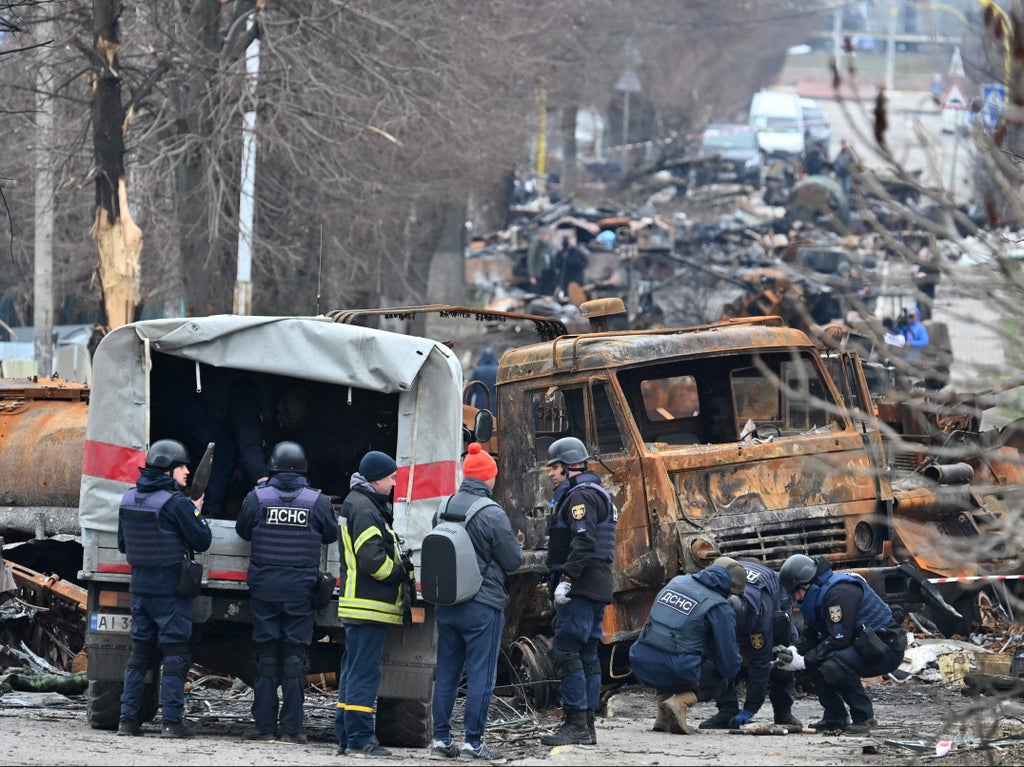
The UK, US and European Union are preparing to hit Russia with fresh sanctions in response to civilian killings in northern Ukraine that have been condemned as war crimes.
The sanctions on Wednesday will target officials and their families - with reports suggesting Vladimir Putin’s daughters Maria Vorontsova, 36, and Katerina Tikhonova, 35, will be hit by American and EU measures - as well as Russian banks and state-owned enterprises, the White House has indicated.
Proposed EU sanctions would ban buying Russian coal, prevent Russian ships from entering EU ports, and suspend nearly 20 billion euros (£16 billion) worth of trade.
In London, a Foreign Office source said announcements would also be coming from the UK side.
It comes after reports emerged of civilians being found shot at close range, some with their hands tied behind their backs, lying on the streets of Bucha north of Kyiv following the withdrawal of Russian forces from the city.
Ukrainian president Volodymyr Zelensky said Russian troops had committed the “most terrible war crimes” since the Second World War as he claimed innocent people had been shot in cold blood in their homes or on the street and crushed in their cars by tanks, while many women had been raped.
Foreign secretary Liz Truss said economic actions so far were having a “crippling impact” and “pushing the Russian economy back into the Soviet era”.
She said sanctions had frozen more than $350bn (£266bn) of “Putin’s war chest”, rendering unavailable over 60 per cent of the regime’s $604bn (£459bn) of foreign currency reserves.
She will join Nato counterparts in Brussels on Wednesday ahead of Thursday’s full meeting of the alliance’s foreign ministers.

The meeting comes as British defence intelligence warned of a humanitarian catastrophe in the Ukrainian port of Mariupol, which has been besieged and bombarded by Russian forces.
The Ministry of Defence said the humanitarian situation in the city continued to worsen, with most of the 160,000 remaining residents left without light, communication, medicine, heat or water.
Health secretary Sajid Javid said an image of a Ukrainian mother who scrawled contact details on her two-year-old daughter’s back in case she and the rest of the family are killed in the conflict “strengthens the resolve for all of us”.
Boris Johnson issued a direct appeal to the Russian people to reject Putin’s war in Ukraine, which he called a “stain” on their country’s honour.
In a video message, the prime minister urged Russians to download VPNs to enable them to circumvent the Kremlin’s media controls and see for themselves the atrocities being committed in their name.

Speaking in Russian, Mr Johnson told Russia: “Your president stands accused of committing war crimes. But I cannot believe he’s acting in your name.”
His intervention came after Zelensky used a dramatic address to the United Nations Security Council to call for the creation of a special tribunal along the lines of the Nuremberg tribunals, used to try leading Nazis, to bring those responsible to justice.
The Kremlin responded by claiming images of civilians said to have been killed by Russian soldiers in Bucha were “fake news” having been staged by the Ukrainians themselves.
But the UK Ministry of Defence said analysis of satellite imagery from 21 March - when the town was still occupied by the Russians - showed at least eight bodies lying in a street.
In his message, Mr Johnson said the “atrocities” committed by Russian forces - including the rape and massacre of innocent civilians - were so shocking that Mr Putin had deliberately sought to hide the truth from his people.
“Your president knows that if you could see what was happening, you would not support his war,” he said.
“He knows that these crimes betray the trust of every Russian mother who proudly waves goodbye to her son as he heads off to join the military.
“And he knows they are a stain on the honour of Russia itself. A stain that will only grow larger and more indelible every day this war continues.”
The Independent has a proud history of campaigning for the rights of the most vulnerable, and we first ran our Refugees Welcome campaign during the war in Syria in 2015. Now, as we renew our campaign and launch this petition in the wake of the unfolding Ukrainian crisis, we are calling on the government to go further and faster to ensure help is delivered. To find out more about our Refugees Welcome campaign, click here. To sign the petition click here. If you would like to donate then please click here for our GoFundMe page.
Additional reporting by Press Association







